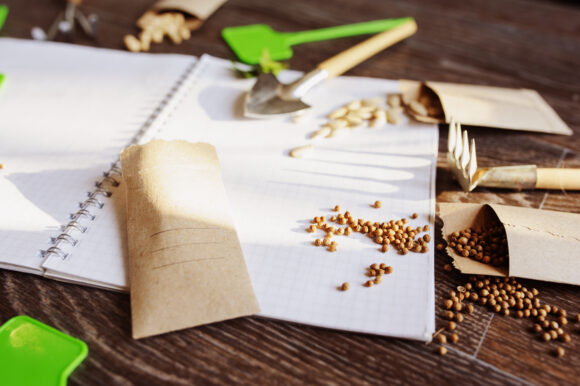
Spring garden preparation for sowing seeds and planning.
By William Errickson, Agriculture and Natural Resources Agent for Rutgers Cooperative Extension of Monmouth County
As the days grow longer and the temperature slowly rises, a restlessness starts to build inside most gardeners. We are ready to be outside again, breathing the fresh air and tending the gardens with our hands in the earth. However, the soil is still frozen and the days of working outside in the warmth of the sun are still several months away. Luckily there are many things you can do from the comfort of the indoors to prepare for the gardening season ahead.
Whether you are a new gardener who is eager to grow your first tomato or a seasoned horticulturist with two green thumbs, Rutgers Cooperative Extension has many resources available to help you succeed in producing lush, healthy plants, while conserving natural resources and having a positive impact on the surrounding environment.
A great place to start is the Rutgers New Jersey Agricultural Experiment Station (NJAES) Home, Lawn, and Garden website (njaes.rutgers.edu/home-lawn-garden). This user-friendly website is a gateway to horticultural knowledge that has been developed by NJAES faculty and staff specifically for home gardeners. Topics include ‘What to Plant,’ ‘Gardening with Youth,’ ‘Nutrition and Wellness,’ ‘Urban Gardening,’ and more to provide accurate, reliable, and accessible information. The website also features a Plant of the Month and a calendar of upcoming Home, Lawn, and Garden events.
One exciting event that is coming up is the webinar series: Coffee Talks for Home Gardeners presented by the Monmouth County Master Gardeners. This free online program will feature a live presentation by a different speaker each Saturday morning in February. Each session will focus on a horticultural topic designed to prepare you and your garden for the spring and beyond, including spring vegetable gardening, growing dahlias, landscaping with ferns, and all about honeybees.
Another resource to help you gear up for the gardening season is the RU Ready 2 Garden Webinar series. This collection of recorded webinars features numerous episodes on various gardening topics from NJAES experts and their colleagues to provide tips and advice for gardeners of all levels of experience. Presentations on ‘Easy to Grow Vegetables for Your Garden,’ ‘Creating a Pollinator’s Paradise in Your Yard,’ and ‘Indoor Seed Starting’ provide the foundational knowledge you need to successfully grow the garden you have been dreaming about all winter.
For those who might feel inspired to pursue additional horticultural training, the Rutgers Master Gardener Program offers an excellent opportunity to receive in-depth, hands-on instruction from NJAES faculty and professional staff. Participants in this program receive over 60 hours of instruction and contribute volunteer hours in support of Rutgers Cooperative Extension in its mission to deliver horticulture programs and information to the public. Trained Rutgers Master Gardener volunteers also operate a year-round telephone helpline to advise the public about horticultural matters and diagnose and solve any home gardening problems that you might encounter.
When it comes time to apply all this new-found knowledge to your garden plan, there are a few practical considerations to keep in mind. First and foremost, a small, well-cared for garden is usually more productive and more fun than a large garden that is out of control, so it is highly advised to start small and then grow from there. Once you have enjoyed success on a small plot, you can expand to a larger area and try new crops. Over the winter, you can also start thinking about where the garden should go. Ideally, the garden should be in a sunny location that is well drained. A garden that is located closer to the house is also likely to receive more attention than a garden that is farther away because you will see it more often and notice any plants that need tending. Proximity to a water source is also a plus, and if your location has a high risk of wildlife damage, you may want to consider fencing or bird netting. Take some time to draw out your garden plans on paper before going out into the field. This will help you to visualize what you are trying to accomplish before putting any seeds in the ground.
When the soil finally thaws, it will be time to take a soil fertility test to ensure that your plants have the optimum levels of nutrients required for healthy growth. The Rutgers Soil Testing Laboratory (njaes.rutgers.edu/soil-testing-lab) offers accurate and affordable soil fertility analyses for gardens of all sizes, with custom recommendations for the specific crops you are planning to grow.
The anticipation of the upcoming growing season can be a very exciting time for both new gardeners and lifetime stewards. Rutgers Cooperative Extension has a breadth of resources available to help you succeed in your horticultural endeavors as you develop your green thumb.

